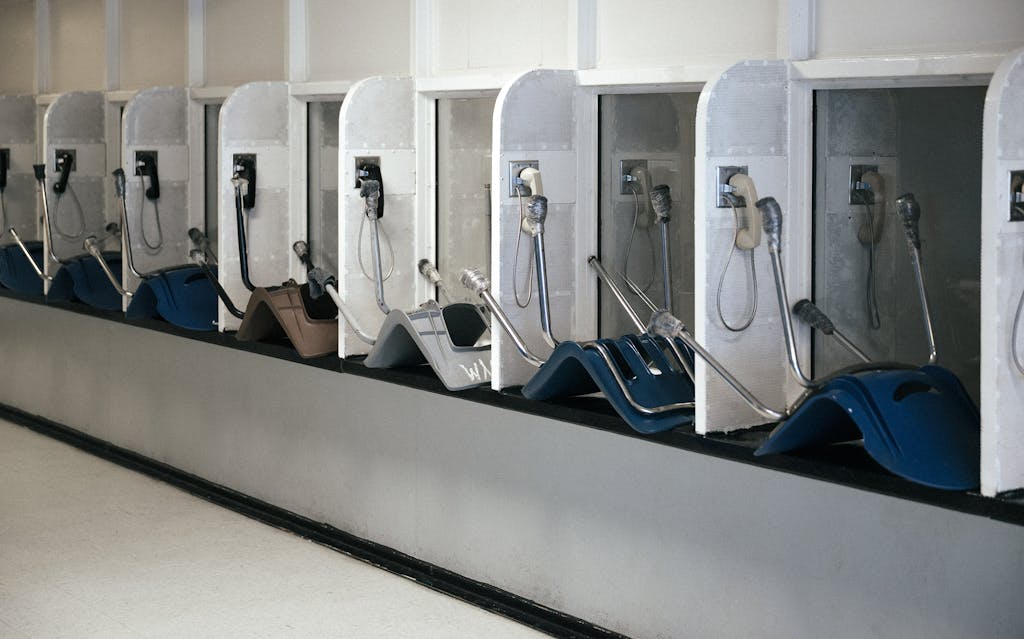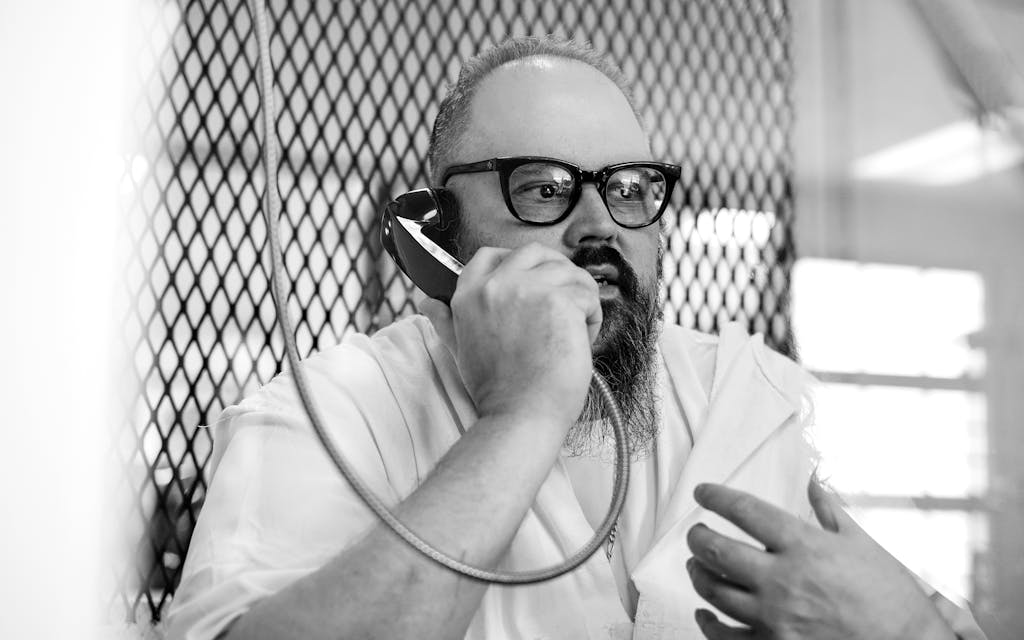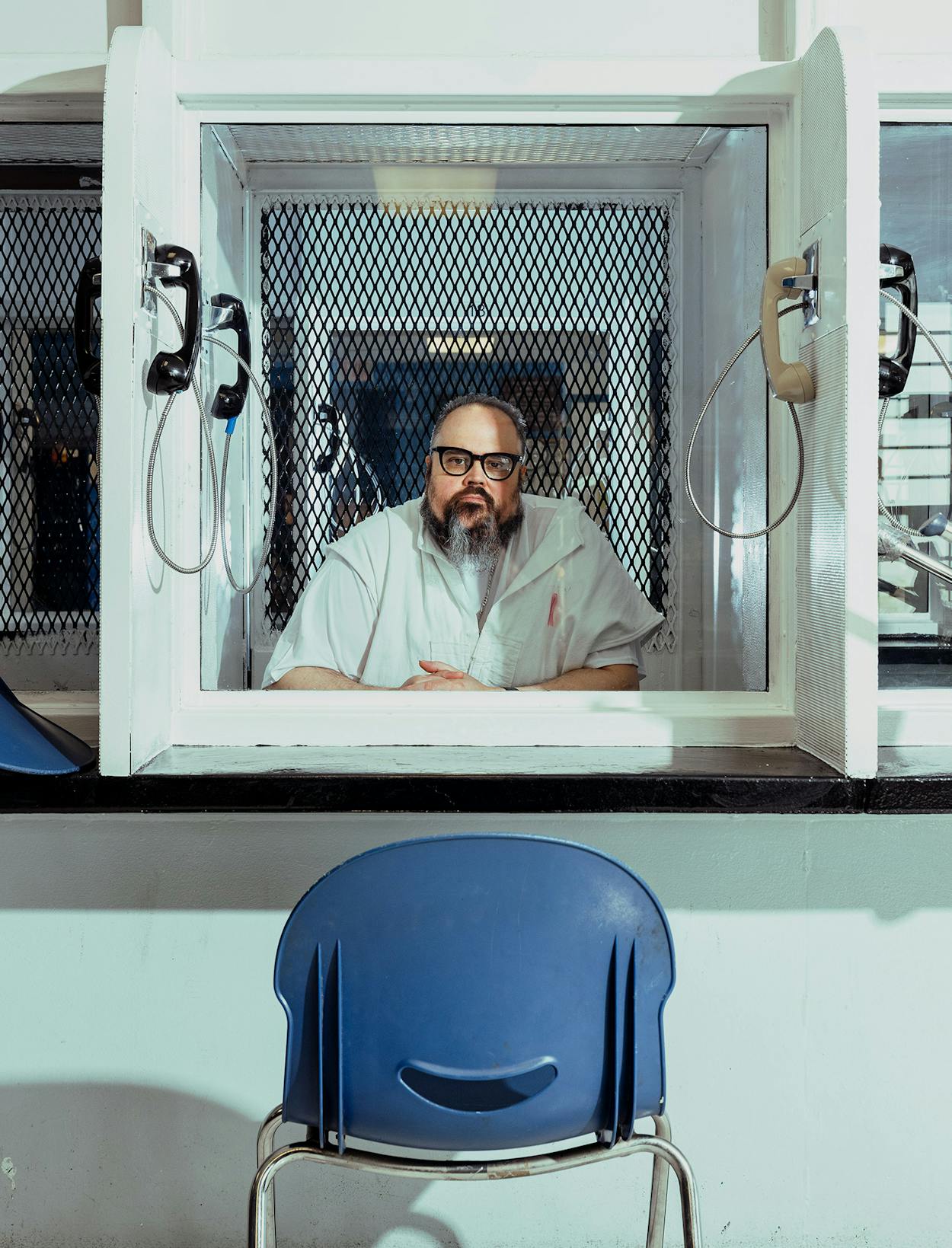It’s common, when trying to muster up compassion for someone sitting on death row, to imagine them as “somebody’s child” or “somebody’s father”—a sort of humanity by proxy, through the lens of a loved one. But, sitting in the Polunsky Unit, in East Texas, where he is waiting for his execution date on Thursday, Will Speer has never really fit that description. Abused, used, and manipulated his entire life, Speer entered the Texas prison system as a teenager. He is, in some ways, exactly the kind of person you expect to find on death row—someone who never really had a chance.
That’s how he knows whom to pray for, he told me. “I want to pray for the people nobody else wants to pray for.”
Sitting for a mini junket of press interviews on the last media visitation day before his execution, Speer had gray in his beard, and his hair was cropped short behind a slightly receding hairline. His eyes were warm and earnest behind thick-framed glasses, and he wore a pink ribbon pinned to his white prison garb. “October is Breast Cancer Awareness Month,” he told me. He doesn’t know anyone who has had breast cancer, he said, but his dad died of cancer, so the cause feels relevant.
At 49, Speer filled the tiny booth where he sat for interviews, earning his nickname, “Big Will.” That’s what the other inmates call him as they pray and worship with him every morning at 7 a.m. Speer is the one of the first-ever inmate faith-based coordinators on Texas’s death row. Launched in November of 2021, the Faith-Based Program, administered by Texas Department of Criminal Justice’s Rehabilitation Programs Division, took 28 death row inmates—they call themselves the God Pod—through an eighteen-month program comprising several weekly classes, daily community discussions, and religious services. In all, the inmates devoted twenty to thirty hours per week to the program.
“The primary goal,” said TDCJ communications officer Robert Hurst, “is to help the participants reach a point in their lives where they are truly repentant for their actions, seek forgiveness, and find inner peace with God.” Speer immediately applied for the program in 2021 after two decades on death row. He wanted to change, he said. For Speer, change looks like “be[ing] transformed by the renewing of your mind.” He pulled the quote from the book of Romans in the Christian Bible, a verse he uses a lot. He repeatedly tells himself and his fellow inmates that change is possible, not because a human can stop making mistakes, but because humans can all be forgiven and all human beings are loved by God. “Whose I am is where my value comes from,” he said, with the conviction of a preacher heading for the crescendo. That goes for you as well, he added, gesturing at me through the plexiglass.
That belief offers its own evidence of change, because Speer was trained from an early age to feel worthless.

In Speer’s clemency petition, mitigation specialists with Texas Defender Service compiled extensive testimony of the abuse Speer endured as a child prior to his first murder conviction, in 1992. The accounts are harrowing. As a mother reading it, I had to set aside several times to create some emotional distance. When you read about children being asked to test methamphetamines for their parents, or being sexually abused, or consequently wetting the bed and then being placed in a corner with the urine-soaked underwear on their head, you can’t help but imagine your own children.
Jurors never heard about that abuse, according to Speer’s clemency petition. It was not presented when he was tried as an adult after murdering the father of one of his friends at age sixteen, allegedly for payment. Speer says in recorded testimony that his motivation was not the money but the influence of his friend. The friend was legally an adult, and Speer was, in his own words, “willing to do anything to make, or keep, a friend. That overwhelming desire led me into putting a false friendship above the life of another human being.”
For Speer, as a juvenile in an adult jail, history seemed to repeat itself. “I was scared out of my mind,” he said. Joining a prison gang seemed like the best way to stay safe, but it was eventually what would send him to death row. When the gang told him to murder his cellmate, Gary Dickerson, he did it.
At the trial, Dickerson’s sister, Sammie Gail Martin, was told that Speer would likely get a light sentence since the victim was another inmate. But she wanted the jury to know that Gary Dickerson—a regular letter writer and a matchstick-craft maker—was somebody’s brother, so she testified to his humanity. It wasn’t that she wanted Speer to have the maximum sentence, she told me. Two of her brothers died in prison, and the third was released from prison into her care when he was dying of liver cancer. He spent his final three weeks in her home. “I believe in forgiveness,” she said. “There’s times when I’ve asked the Lord to forgive me.” The reason she testified, she explained, was that she didn’t want her brother’s humanity—or rather, perceived lack thereof—to be the reason for a lighter sentence.
Speer carried the brunt of the punishment for a larger conspiracy in the murder of Dickerson. This time he was sentenced to death and transferred to the Polunsky Unit, in Livingston, Texas. He arrived on October 31, 2001, when he was 27. He remembers the date well, because after sitting with lawyers to get his will and other death-related documents in order, he said, the chaplain hugged him. “The last person I’d gotten to hug chest to chest was my father,” Speer said. It had been ten years.
For a while, Martin said, she kept tabs on Speer. He seemed like a bad guy, exactly the kind of prison gang member she’d expected him to be. And for a while, he was.
At Polunsky, however, Speer’s path took a turn.


Speer arrived at a crowded time on death row, and tensions, particularly racial tensions, were high, said fellow death row inmate Tony Ford, writing as part of Speer’s clemency effort. Ford, who is Black, heard about Speer and expected him to join up with one of the white gangs. Racial groups—the Aryan Circle, the Aryan Brotherhood—he said, “expected white folks to ride with them. That’s not what Will did. . . . As the months went by, we saw that he stands on his own. He would not do that.”
But Speer did join up with the Faith-Based Program, for which admission was based on good behavior. It’s reserved for those who have demonstrated desire and capacity for change—what Christians like Speer and Martin might call redemption. Ford joined, too, and was in the minority as a Muslim. Though there were Buddhists, other Muslims, and an Odinist, he said, the program had a very Christian feel to it, and Speer made sure they didn’t feel excluded. Speer often helped him get his pork-free meal tray, Ford said.
Speer became an informal mediator in disputes. “When we [the field ministers] aren’t back there, problems can arise,” said Terry Solley, an inmate in the Polunsky Unit who is serving a 35-year sentence for bank robbery and expects to soon be out on parole. If someone stole something from another inmate, Speer would encourage them to give it back. If there were escalating tensions, he would offer to help the men talk through it. “He’s a peacemaker,” Solley said.
The hope he found in the program, Speer told me, changed everything around him. Hope is not, as he describes it, a consolation prize to ease the grief for the life he will never know on the outside. The children he will never have. The cereal aisles he will never peruse. The state parks he will never visit. When he was baptized in a big blue kiddie pool surrounded by his friends from the Faith-Based Program, Speer’s new hope was not that God would somehow miraculously get him out. (On Tuesday, the Texas Board of Pardons and Paroles unanimously denied Speer’s application for clemency and request for reprieve.)
No one pitches a health and wealth gospel to the men on death row, or even to those serving life in prison. Marketing such tangible hope would be irresponsible, said the Reverend Anthony Griggs, a prison chaplain of twenty years who lives in San Antonio. In prisons you’ll more likely hear hope defined as a vision for heaven, for a sense of purpose and worth that can make a difference inside the prison. Griggs encourages the men to own their wrongs but not let those wrongs set fatalistic trajectories for their lives. Forgiveness might not mean walking freely back into society, but it can mean living without bitterness, hatred, and self-loathing. Griggs brings up the common refrain at the heart of every argument for the humanity and dignity of people in prison. “If I can’t forgive somebody, then I’m as wrong as two left shoes, because I’ve been forgiven.”
In addition to the spiritual uplift, there was another tangible change Speer wanted to make. He wanted more kind human contact. When he thinks about that hug from the chaplain in 2001 and how many of his fellow prisoners experience no human touch beyond the guiding hand of a prison guard, it makes him want to look for deliberate opportunities to offer hugs and handshakes. “We traded the thug life for the hug life,” Speer told me, chuckling at his own catchphrase. It struck me that parts of him will always be seventeen years old.

On August 17, Speer learned that his execution date had been set. He was transferred out of his unit to a different part of the prison. As he walked out, he heard voices calling out that they loved him. “I just stopped and began to get emotional,” he said. “God showed me that I already had made an impact.”
There was a little twinge in his face, the tiniest flinch of pain, when I asked what he would do if he had more time. Become a field minister, he said. It’s a program TDCJ offers in partnership with Southwestern Baptist Theological Seminary, in Fort Worth. If his sentence were to be commuted, or if he were granted clemency, he said, he’d know that while he would spend the rest of his life in prison, he could also spend the rest of his life as a minister.
He does still plan to live the rest of his life as a minister, he said with a grim chuckle during our interview. It’s just shorter. With a knowing look, he reminded me that we will all die, me included—he just knows exactly when.
This week, as he’s driven down the serene rural highway to the Huntsville Unit, where executions are carried out, the towering pine trees will, in all likelihood, be glittering with light, and Lake Livingston will sparkle on the way across. It’s a beautiful last few miles, a scene ripe for reflection, especially if you’re seeing it for the first and last time all at once. Since he’s been on death row, Speer has counted 331 executions, many for those he considered friends. He’s heard stories of bad plea deals, underfunded public defender programs, and a litany of injustices—but that’s for someone else to focus on, he said. He has to focus on accepting responsibility for what he did, and treating his last days as amends of some sort.
He thinks about the people who lost their son, brother, and boyfriend long before this week. There are people no longer in his life because of his choices, he said. His dad died of cancer, and his mom was murdered by the stepfather who had abused him. They died without their son in their lives, and he feels sad for that. He also prays the “sinner’s prayer”—which evangelical Christians pray in committing their lives to Jesus—on behalf of his victims, because he feels sorry that he stole the opportunity from them to pray it for themselves. And he thinks about the family members of the men he murdered—especially Sammie Gail Martin.
Martin said she was not informed, as she was supposed to be, when Speer’s execution date was set. But she checks in on him frequently enough that she found out, and she soon saw the clemency petitions and a video of Speer telling his story and talking about his relationship with Jesus. She decided to send a letter to the Texas Board of Pardons and Paroles supporting the request for clemency, along with evangelical pastors and anti–capital punishment activists. Her parents and siblings are all dead—like Speer, she’s lost most of her family. She doesn’t see the purpose in another death, not when Speer has decided to try to make the world better. “It’s just a feeling. A lot has to do with my faith,” Martin said. “I’m not sure it’s up to us to choose someone’s death.”
Speer requested a call with Martin, and he told me, in our interview, how much he wanted to tell her he was sorry. (They spoke for about an hour on Thursday, and Martin passed word to me through the mitigation specialist that the experience had been very moving.) Speer is putting his affairs in order, spiritually, and I asked if it helped more to think that clemency was possible or if it felt more peaceful to accept that Thursday was coming.
He answered with the story from the Old Testament book of Daniel about the three Judean exiles in Babylon— Shadrach, Meshach, and Abednego—who were sentenced to death for refusing to worship King Nebuchadnezzar. The three young men believed God would deliver them. They professed God’s faithfulness even as they were thrown into the fiery furnace.
“I believe I’m going to get a stay [of execution],” he said, with surprising gusto, given how much we’d just talked about acceptance and final preparations. I looked up from my notebook to see where he was going with this.
A delay of execution can be granted for review of a court case, as it was in 2022 for Melissa Lucio, when the Texas Court of Criminal Appeals granted her a stay so that a trial court could consider evidence of her innocence. Speer’s legal team is arguing that Speer should receive clemency, a commutation of his sentence to life in prison, in part because of the omission of the history of abuse from his first trial. But it knows the odds. Since 1976, when Texas reinstated the death penalty, the state has granted only three clemency requests.
Speer knows this, so it was strange to hear him state his belief that he would be shown mercy. Then he continued: “But even if it doesn’t, I will still praise Him.”
In the story from the Old Testament, a divine presence joins the men in the fire, and they survive. If Speer goes into the execution chamber on Thursday, God may be with him, but he knows there will be no miracle survival.
It’s hard to look at Speer and not see the little boy who thought that violence was all he deserved and all that would keep him safe. It’s hard not to see his prison time as inevitable, given the trajectory of his childhood. But looking at Speer through the plexiglass during his last media interview—which he saw as a new opportunity to send a message of hope, he said—listening to him pray, and hearing him speak about his calling, his ministry, and his faith, it occurred to me that he has been transformed. He’s been transformed into someone’s child—God’s. He’s been transformed into someone’s father—the men in his unit whose lives he has touched. It wasn’t being a child and a father that made him a human worthy of compassion. It was the other way around, and he would want me to tell you that this goes for you too.
- More About:
- Prisons
- Death Row
- Death Penalty






